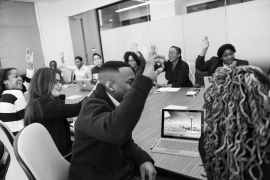Imagine the scenario… You’re in class, checking answers to a gap fill activity on gerunds and infinitives.

Teacher: Sergio, number three please,
Sergio: He suggested going to the cinema.
Teacher: Yes, he suggested going to the cinema.
“What’s so wrong with that?” I hear you ask …
Although your intentions are good, by repeating Sergio’s answer so that you can make sure the whole class has heard it, Sergio is now confused and is possibly thinking “well that’s exactly what I said, did I not get it right? Maybe I pronounced something wrongly!” You’ve just dented Sergio’s confidence! Poor Sergio.
Furthermore, the rest of the group realise that they don’t need to listen to each other because they know you, with your nice, loud, clear teacher’s voice, will be repeating the answer for them anyway. As a result, the feedback becomes more teacher-centred than necessary and the students learn not to communicate with each other but always through you. This, as a result, damages their self-confidence because, when they are out in the real world, they believe they can’t understand what others are saying because they don’t speak as clearly or as slowly as their English teacher does.
So, what’s the answer? Let’s look at the conversation with Sergio again:
Teacher: Sergio, number three please.
Sergio: He suggested going to the cinema.
Teacher: Good, Sergio. (Teacher writes or displays on the board 3. going)
This gives a visual reinforcement of the answer so that weaker students can make sure they have the answers correct, even if they didn’t understand what their fellow students said. It also means good students have the possibility to go away and go through the activity again, thinking about why we say suggested going rather than suggested to go.
Situation 2 … The students are discussing their plans for the weekend as a freer practice activity for going to and present continuous.
Svetla: At the weekend I’m going to visit my grandmother and then I’m meeting Jan at the cinema.
Petra: Ah that sounds nice, I’m going to bake a cake for my sister’s birthday party.
Teacher: Right, let’s stop there, Svetla what are your plans for the weekend?
Svetla: At the weekend I’m going to visit my grandmother and then I’m meeting Jan at the cinema.
Teacher: ok, and you Petra?
Petra: I’m going to bake a cake for my sister’s birthday party.
Teacher: Good
What would be more useful?
Teacher: Right, let’s stop there, Svetla what are Petra’s plans for the weekend?
Petra: She’s going to visit her grandmother and then she’s meeting Jan at the cinema.
Teacher: ok nice, and Svetla, what about Petra?
Svetla: She will bake a cake for her sister’s birthday party.
Teacher: She will bake?
Svetla: She is baking
Teacher: Good, Svetla, it sounds like you are both going to have interesting weekends!
By giving feedback on their partner’s answers, rather than just repeating their own, the teacher is encouraging her students to listen to each other. Secondly, the teacher gives feedback, not only on the language used during the conversation but also on the content- sometimes we forget to actually listen to what our students are saying as we are so focused on listening to the language they produce! Did you notice the nice self-correction the teacher used?
What do you think is important when checking answers and giving feedback? Any tips to add?
